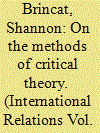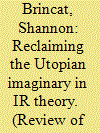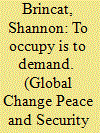|
|
|
Sort Order |
|
|
|
Items / Page
|
|
|
|
|
|
|
| Srl | Item |
| 1 |
ID:
094321


|
|
|
|
|
| Publication |
2009.
|
| Summary/Abstract |
This article illustrates the importance of negativity within the dialectical method, aiming to bring clarity to what has been rendered unnecessarily mystical within recent revisions of dialectics, particular in the conception of "meta-dialectics." The negative element in dialectics, where in the movement of sublation the subject remains undetermined and nonidentical, is argued to be the productive moment in the dialectical movement that leads to open-ended and ongoing processes of change. The article argues that considerable conceptual difficulties arise if one attempts to counterpose negative dialectics to positive dialectics and particularly in interpretations of Hegel's Logic and Adorno's Negative Dialectics that attempt to do so. The two moments of positivity and negativity are shown to be mutually related. If conceived in this manner, dialectical analysis can provide radical insights into processes of social change in world politics that are, and remain, open ended.
|
|
|
|
|
|
|
|
|
|
|
|
|
|
|
|
| 2 |
ID:
113818


|
|
|
|
|
| Publication |
2012.
|
| Summary/Abstract |
This article offers a reconstruction of the methodological tools pioneered by the first generation of the Frankfurt School (FS) and how they have been adapted in the contemporary project of emancipation in Critical International Relations Theory (CIRT). It is argued that the praxeological and methodological commitments of the early FS are of continuing utility in the post-positivist turn in IR theory. The paper also argues that CIRT has made significant advances on the original programme of CT developed by Horkheimer in the early 1930s. In particular, it is contended that the alleged pessimism typically associated with the later work of the early FS can be overcome if critical analysis looks beyond the state to those possibilities of emancipation pregnant within the global processes of world politics. Here the work of CIRT is argued to offer a number of advances on the sociology of the early FS, which was problematically confined to the examination of Euro- and state-centric possibilities for emancipation.
|
|
|
|
|
|
|
|
|
|
|
|
|
|
|
|
| 3 |
ID:
090357


|
|
|
|
|
| Publication |
2009.
|
| Summary/Abstract |
This article aims to reinvigorate the utopian imagination as a vital and necessary component in IR theory. Since the First Great Debate between the Realists and the Utopianists (or more accurately, the Liberal-Internationalists) the utopian tradition has been viewed as being both subjective and arbitrary, leading to its dismissal as vain idealism in world politics. This article re-interrogates the arguments of Carr and Morgenthau and finds that they have relevance today only as against closed systems of utopia and have little bearing against the open-dialectical utopianism which is advocated here as a viable alternative to the sterility of realism. The article also examines the historical nexus between realism's dismissal of utopianism and the wider movements in political philosophy via a critical engagement with the works of Popper, Berlin and Arendt. Finally, after exploring the limitations of Booth's idea of 'Utopian Realism', the article argues that utopianism should no longer be assumed to be a blueprint for a future, perfect society, a tradition fraught with the danger of proto-totalisation, but as a critical imaginary that acts as a heuristic device to reveal the fissures in existing reality and as an ideational motivating force for progressive change in world politics.
|
|
|
|
|
|
|
|
|
|
|
|
|
|
|
|
| 4 |
ID:
118027


|
|
|
|
|
| Publication |
2013.
|
| Summary/Abstract |
The question of making demands has become somewhat fetishized in the Occupy Movement, the one thing endlessly debated in each local occupation and in nearly all journalistic or academic commentaries on the phenomena. This is not without good reason. For to 'demand' presupposes at least two things: that there is a coherent object of need or desire to be obtained, and that there is some person, body or institution that can grant it. Neither presupposition however, holds in the context of Occupy, whose aims, make-up and decision-making processes change from city to city, and from person to person involved within it. While opposition to income in equality and control of financial institutions over public life are common themes, as is direct action and dialogic internal forms of consensus-building, these do not permit a definitive set of oppositional demands, at least in the traditional political sense. Occupy, then, is a hitherto unknown form of political expression.
|
|
|
|
|
|
|
|
|
|
|
|
|
|
|
|
| 5 |
ID:
110783


|
|
|
|
|
| Publication |
2011.
|
| Summary/Abstract |
Dialectics remains an underutilized methodology in contemporary IR theory, which represents a significant limitation to the study of world politics, particularly in under-standing processes of transformation and change - an oversight that this article intends to redress. This article has two primary goals. First, it aims to reconstruct and build upon the small but robust debate concerning the validity of dialectics in IR that has been championed previously by Alker and Biersteker, and Heine and Teschke, respectively. Second, it contrasts dialectical and deterministic approaches to IR, as exemplified in Coxian Critical Theory and neo-realism, as a means to showcase the merits of the former as an approach to the study of social change in world politics. The ultimate aim of the article is to offer the groundwork of a social-relational dialectical approach to world politics that is focused on the intersubjective engagements between human beings, which can be developed in future research. Through such an analytic, the dialectical processes in social life are shown to be open-ended and the article rejects any understanding of 'inevitable' progress/regress or teleological end point. On the one hand, this account of dialectics promises greater analytical potential for understanding processes of change in world politics but, on the other, indicates the potential for the irrational toleration of contradiction and antagonism as an accepted feature of social life. Ultimately, the article argues that the skilled dialectician should emphasize human agency and intersubjectivity within a social-relational dialectical approach to world politics.
|
|
|
|
|
|
|
|
|
|
|
|
|
|
|
|
| 6 |
ID:
183469


|
|
|
|
|
| Summary/Abstract |
The transformation of the Kurdish Freedom Movement towards Democratic Confederalism has promised a new horizon for emancipatory political organisation. This article examines the relationship between Bookchin’s political theory of communalism and Öcalan’s democratic confederalism informed by various lived practices of the Kurdish Freedom Movement. After situating this movement in the geopolitics of the contemporary Middle East and international relations, the article explores the social and historical framework of Bookchin’s theory and its specific rejection of hierarchy that has been taken up conceptually and politically by Öcalan. We trace this in the dissolution of the PKK and the adoption of the new paradigm of democratic confederalism. The second part examines this organisational basis of the Kurdish Freedom Movement’s in its support for local, autonomous, and federated, forms of direct democracy and the complementarities between Bookchin’s and Öcalan’s theorisation of communalism and confederalism. Finally, we look at the regional and international organisational and political implications of the transformation of the Kurdish Freedom Movement in its shift away from Marxist-Leninism, nationalism, and statism, towards communalism and examine both the challenges and opportunities facing this revolutionary process.
|
|
|
|
|
|
|
|
|
|
|
|
|
|
|
|
|
|
|
|
|